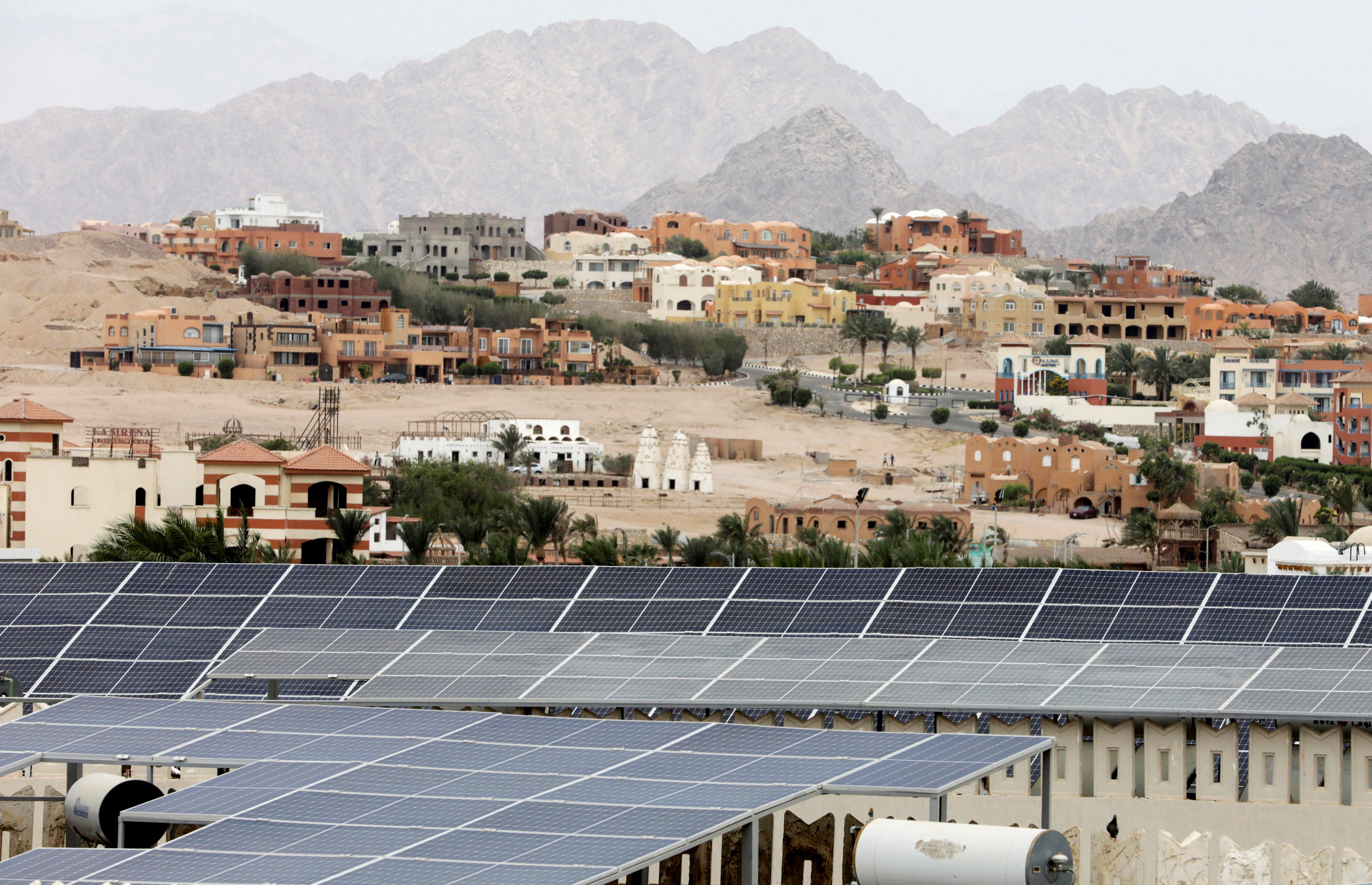
Egypt's Green Transition:
Nurturing a Sustainable Economy and Workforce
Policy Note, July 2023
Accelerating the growth of the green economy should happen rapidly through policy actions. If the global green transition is left to market forces, it can have grave consequences for the world. Considering the varied levels of technological advancements among countries, some will be better placed to develop and push forward green technology, whereas others will simply be adopting these new technologies. As a developing country, Egypt should play the latter role and follow these three steps: 1) boost the growth of the green economy and enhance the adoption of green technologies in traditional sectors; 2) raise public awareness on the dangers of climate change and the role of green technology in adapting and mitigating its effects; and 3) prepare a workforce that has the technology literacy required to adopt the available green technology.
The devastating effects of global warming are expected to hit some of the world’s most vulnerable regions the hardest, including the Middle East and North Africa.1 With the largest population in the region, climate change can have disastrous economic consequences for Egypt and its neighbors.
With average global temperatures increasing by 2 degrees Celsius or more above pre-industrial levels, Egypt will be affected in two ways. First, heat waves will increase in intensity and frequency. Over the past 30 years, annual temperatures in Egypt have increased by an average of 0.53 degrees Celsius per decade.2 By 2050, temperatures are expected to rise by another 1.5 degrees Celsius to 3 degrees Celsius. As a result, the number of extremely hot days are expected to surge by around 40 additional days, increasing the risks of desertification, particularly in lower Egypt.3
Second, sea levels are expected to rise along with increased floods, and reduced water availability. Sea levels have risen by 1.8 mm annually through 1992 and then by 3.2 mm annually after 2012 and were expected to rise 1 mm to 6 mm per year along the coastal zones afterward. Rising sea levels will particularly affect urban areas in Alexandria, in northern Egypt. It will also affect densely populated cities in the Nile delta, where there is a high concentration of cities and fertile agricultural lands.4
As countries try to work together to combat the threat of climate change and move toward a shared vision of environmental sustainability and social justice, transitioning into a greener economy is a key objective. A main requirement for moving to a green economy involves preparing the workforce by enhancing their green skills. However, many developing economies are lagging in terms of workforce preparation, and Egypt is no exception.
What does a green transition mean for developing countries like Egypt, which hosted the Climate Change Conference (COP 27) in November 2022? What active measures should be considered for the Egyptian labor market? And how should the Egyptian government prepare and enhance the skills of its workforce for the transition ahead?
What is the green transition?
Green transition is a global endeavor to mitigate the negative effects of climate change. For an economy to become “green,” it should work toward a new development model that ensures environmental sustainability. A green transition implies a drastic reduction in the emissions of carbon dioxide and other greenhouse gases, which requires a radical shift in all areas of the economy and in people’s lifestyles. The ultimate goal is to switch to a green economy that does not squander, pollute, or waste resources in order to repair and safeguard the environment. As with any cultural shift, this transition requires all segments of society to work together toward a common goal.
In envisioning a green economy, we need to isolate and reimagine the economic factors that have contributed to climate change and move toward a solution. Focusing on the labor market specifically, we need employment opportunities that directly or indirectly protect, preserve and restore the environment. In other words, we need to provide “green occupations.” Green occupations can be one of two things. First, jobs that benefit the environment or conserve natural resources, which we refer to as “direct green jobs.” Second, “indirect green jobs,” which are jobs within an establishment where the worker’s main responsibility is to make the production processes more environmentally friendly or use fewer natural resources.
In theory, a complete green transition can happen when green technology becomes cheaper than fossil fuel.5 In the absence of policy actions, this should start happening gradually when the available oil resources diminish to a point that they become more expensive than renewable energy sources.6 However, waiting for this natural transition to happen can have dire consequences for humanity:7 climate change will not only happen gradually, but over time the frequency and intensity of natural disasters will increase. This highlights the importance of investing in research and development to make green technology cheaper and more efficient than the existing polluting energies.
How does a green transition translate to the Egyptian context?
For a developing country like Egypt, existing human and financial resources do not allow it to operate on the cutting edge of green research. However, it can contribute to the global transition efforts by adopting green technologies and preparing a workforce that is able to use them.
The United Nations Environment Programme outlined six key sectors that fall under the umbrella of a “green economy:” agriculture, forests, fisheries, manufacturing, tourism, and renewable energy.8 A national strategy to stimulate the growth of these sectors is needed. For some sectors, this strategy would focus on alleviating the climate change threat that could harm its economic activities. This largely applies to the agricultural sector which is dependent on the Nile River’s water supply and is especially susceptible to rising temperatures. It is likely that by the year 2060, the agricultural sector in Egypt would forgoes 1.8 million people,9 out from 24 million Egyptian workers today.10 For other sectors, efforts should be directed towards enhancing their growth. This is already observed in Egypt’s sustainable energy strategy which aims to generate 42% of Egypt’s energy demand from renewable energies by 2035.11 Egypt has sufficient land, wind, and solar resources for it to meet this objective and become an energy hub.
Mitigating climate change requires collective effort, so raising public awareness of the prospective dangers is an essential first step in the green transition. When surveying attitudes on the threat of climate change, young Egyptian men and women both say that climate change is a “very serious” threat to their country over the next two decades. Older generations, and especially the men, are more likely to say that climate change is “not a threat at all.”12 The younger generation, who are yet to suffer the devastating effects of extreme weather and poor air and water qualities, are thus more likely to be concerned about the imminent consequences of climate change.
However, participants taking part in quantitative and qualitative studies that focus on how climate change is perceived in Egypt, often mention that it is associated with the fear of catastrophic events. As a result, many feel helpless and powerless and prefer not to engage with the issue.13 This could be related to the fact that the causes of climate change are misunderstood. A common misperception that is prevalent in Egypt is that ozone depletion causes climate change. If actions on how to mitigate climate change are well communicated to the public, it may result in more youth seeking training and careers related to green transition.
In addition to encouraging Egyptians to enhance their green transition skills, the provision of such educational programs needs to follow. In the last three decades, public education resources have been drained by population growth, leaving little space for curriculum improvement and the innovation required to cope with technological advancements.14 Yet, developing green skills may still be possible in Egypt’s schools as it does not require drastic changes to existing curricula.
Green jobs require the knowledge and skills to use green technologies that reduce waste and lessen the impact of human actions on the environment. A recent report by the International Renewable Energy Agency (IRENA) indicates that 51% of all jobs created in the renewable energy sector will focus on operations and maintenance, 22% on installation and 20% on manufacturing. This means that 70% of the jobs created in this sector just require literacy of the existing technology.15
While curricula in the public education sector in Egypt may be slower to adapt due to constraints on the government’s resources, the growing private sector can play a leading role in developing a workforce interested and qualified to undertake green jobs. An interesting feature about the private education sector in Egypt is that it mainly responds to parents and students’ educational desires rather than labor market demands.16 This means that parents and students, who would become more aware of the growing need for green skills locally and internationally, can push private schools and universities to change the curricula.
On-the-job training is also essential to provide the workforce with the needed green technology skills. Particularly young university graduates can benefit from such trainings to better prepare them for the green eco-system. Otherwise, Egyptian workers would have to use their own resources to update their skills and increase their career development within the green economy.
How can the Egyptian government prepare for these challenges?
For Egypt to successfully transition to a green economy, all relevant stakeholders must value sustainability and be adaptable. We suggest three policies to promote green skills:
First, continuing to enhance green technology in traditional sectors is essential for building resilience. While the government has been able to expand the renewable energy sector in the last decade, it has been less successful in doing so in other key sectors that are deemed vulnerable to climate change. The government should introduce programs that enhance traditional sectors’ capabilities to adopt new green technology, taking into consideration the structures of the different sectors.
Second, the fact that most Egyptians believe that climate change is happening and are aware of its catastrophic consequences is a great starting point. Communication about climate change should aim to shift public sentiment from fears to a willingness to mitigate. Awareness campaigns that focus on the causes of climate change should frame them within the local context to make it more relatable. Also, acquiring green skills can be made more appealing by promoting the importance of environmental preservation.
Third, institutional support and funding aimed at enhancing the green skills of Egyptians are essential, and can be done either directly through introducing targeted education and trainings, or indirectly through incentivizing businesses to enhance the green skills of current and future employees. Creating employment opportunities that require a specific skillset naturally encourages workers to acquire those skills. They would be incentivized to learn new skills and to recognize green skills as an asset. Career guidance could play a key role, either as an internal effort, through industry capacity building and sustainability efforts that would require workers to learn on the job, or as an external effort by expanding educational curricula to involve skills trainings for green jobs.

